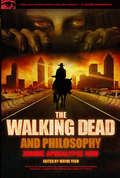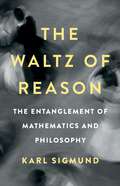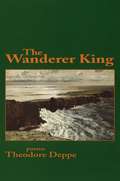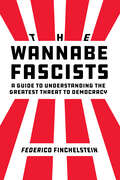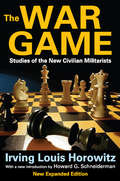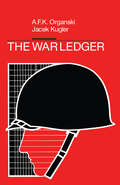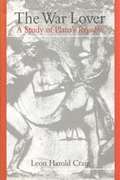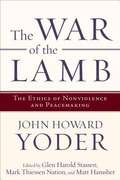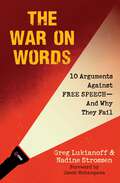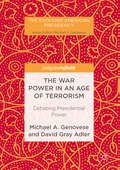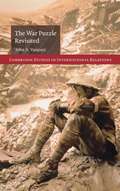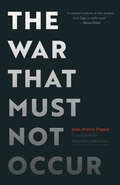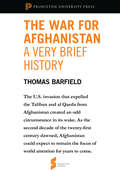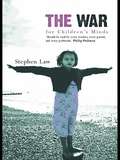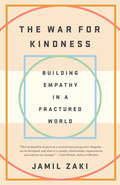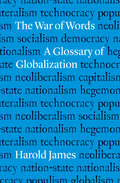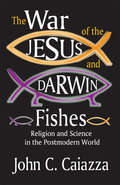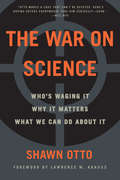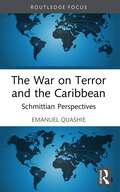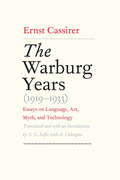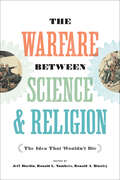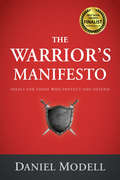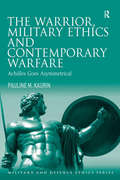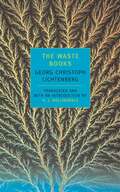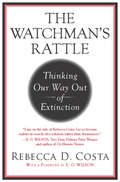- Table View
- List View
The Walking Dead and Philosophy: Zombie Apocalypse Now
by Wayne YuenRick, Lori, Shane, Carl, Dale, Andrea, and Michonne--human survivors of a zombie apocalypse--don't know much about philosophy, but philosophical ideas continue to shamble on through their world, and there's no excape from them.<P><P>The Walking Dead is both a hugely successful comics series and a popular TV show. This epic story of a zombie apocalypse is unique. It focuses on the long-term individual, social, and moral consequences of survival by small groups of humans in a world overrun by infected zombies.Guns, chainsaws, and machetes are not enough for survival: humans also need agreement on rules of conduct. Can equality or fairness have any polace in the post-apocalyptic world? Do theft or even assault and murder become okay under desperate circumstances? Who should be recognized as having political authority? What about eating human flesh? Should survivors have children?As zombies have low IQs, terrible manners, and the overpowering urge to eat people, do they have any rights at all? Am I still me if I become a zombie? Do zombies know anything? are they rational? Would it be ethical to train a zombie and keep it as a pet? What the heck are P-zombies? And why would we all jump at the chance
The Waltz of Reason: The Entanglement of Mathematics and Philosophy
by Karl Sigmund"A mind-bending jaunt ... that makes clear in fascinating detail how math is more than a sum of its parts" (Publishers Weekly) &“Let no one ignorant of geometry enter here,&” Plato warned would-be philosophers. Mathematician Karl Sigmund agrees. In The Waltz of Reason, he shows how mathematics and philosophy together have shaped our understanding of space, chance, logic, cooperation, voting, and the social contract. Sigmund shows how game theory is integral to moral philosophy, how statistics shaped the meaning of reason, and how the search for a logical basis for math leads to deep questions about the nature of truth itself. But this is no dry tome: Sigmund&’s wit and humor shine as brightly as his erudition.The Waltz of Reason is an engrossing history of ideas as vibrant as a ballroom full of dancers, one that empowers as it entertains, following the complex and occasionally dizzying steps of the thinkers who have molded our thought and founded our world.
The Wanderer King
by Theodore Deppe"In these elegant and searing poems, Theodore Deppe gives voice to the full complexity of human character, creating a world that is charged and expansive. With cinematic vividness and stunning eloquence, these poems examine the tensions between hope and despair, responsibility and mystery - as if a sacred universe we were in danger of losing had been stayed at the moment of vanishing. The dramatic monologues are a triumph of the imagination." --Betsy Sholl
The Wannabe Fascists: A Guide to Understanding the Greatest Threat to Democracy
by Federico FinchelsteinMeet today's almost fascists and learn the warning signs to intercept them on the road from populism to dictatorship. With The Wannabe Fascists, historian Federico Finchelstein offers a precise explanation of why Trumpism and similar movements across the world belong to a new political breed, the last outcome of the combined histories of fascism and populism: the wannabe fascists. This new type of populist politician is typically a legally elected leader who, unlike previous populists who were eager to distance themselves from fascism, turns to totalitarian lies, racism, and illegal means to destroy democracy from within. Drawing on almost three decades of research on the histories of fascism and populism around the world, this book lays out in clear language what the author calls the "four pillars of fascism"—xenophobia, propaganda, political violence, and ultimately dictatorship. Finchelstein carefully explains how and why wannabe fascists like Trump, Bolsonaro, and Modi embrace the first three pillars but don't quite succeed in dictatorship and total suppression of the popular vote. The Wannabe Fascists stresses the importance of preventing despots from reaching this tipping point and offers a clear warning for what's at stake.
The War Game: Studies of the New Civilian Militarists
by Irving Louis HorowitzWar gaming has become a characteristic feature of modern life. From amateur clubs to professional academicians playing the war game in the company of military circles, we have come up against the phenomenon of the "robotization" of human life. Irving Louis Horowitz argues that those who protest the idea that war is a game do so on moral grounds that leave unanswered tough questions: What is the alternative to playing the game? What will become of us if we allow the opponent to become the better "player" in an all-or-nothing game of extinction?Horowitz provides answers in a logical manner while focusing on facts and ethical alternatives to risky ethics. The work is divided into three sections: The New Civilian Militarists, Thermonuclear Peace and Its Political Equivalents, and General Theory of Conflict and Conflict Resolution. Included are such topics as arms, policies, and games; morals, missiles, and militarism; and conflict, consensus, and cooperation.Horowitz concludes that it is time to register the fact that the basic option to destructive uses of science is not traditional morality, but better science a science of survival. With a new introduction by Howard Schneiderman along with a major essay and other materials not included in the original edition, this classic work is a worthy contribution to intellectual debate in the twenty-first century and a must read for military strategists, sociologists, and historians.
The War Ledger
by Jacek Kugler A.F.K. OrganskiThe War Ledger provides fresh, sophisticated answers to fundamental questions about major modern wars: Why do major wars begin? What accounts for victory or defeat in war? How do victory and defeat influence the recovery of the combatants? Are the rules governing conflict behavior between nations the same since the advent of the nuclear era? The authors find such well-known theories as the balance of power and collective security systems inadequate to explain how conflict erupts in the international system. Their rigorous empirical analysis proves that the power-transition theory, hinging on economic, social, and political growth, is more accurate; it is the differential rate of growth of the two most powerful nations in the system—the dominant nation and the challenger—that destabilizes all members and precipitates world wars. Predictions of who will win or lose a war, the authors find, depend not only on the power potential of a nation but on the capability of its political systems to mobilize its resources—the "political capacity indicator." After examining the aftermath of major conflicts, the authors identify national growth as the determining factor in a nation's recovery. With victory, national capabilities may increase or decrease; with defeat, losses can be enormous. Unexpectedly, however, in less than two decades, losers make up for their losses and all combatants find themselves where they would have been had no war occurred. Finally, the authors address the question of nuclear arsenals. They find that these arsenals do not make the difference that is usually assumed. Nuclear weapons have not changed the structure of power on which international politics rests. Nor does the behavior of participants in nuclear confrontation meet the expectations set out in deterrence theory.
The War Lover: A Study Of Plato's Republic
by Leon Harold Craig Leon H. CraigThis new examination of the Republic begins with questions ignored by most students of this famous and much-studied dialogue. Why is Plato's most extensive portrait of philosophy pervaded with the language and imagery of war? Why is a discussion supposedly about justice almost entirely about how to educate natural warriors? Why must the philosopher-kings of Kallipolis be first of all 'champions of war'? Why is the supposedly 'feminine drama' of Book Five preoccupied with war? The pursuit of questions such as these brings Craig to an understanding of Plato's teaching about justice, philosophy, and politics that differs radically from what is generally held today. The search for why the Republic's philosophers come from the ranks of 'war lovers' leads Craig to reassess the relation between the `city in logos' and timocracy (the regime openly dedicated to war), and this reassessment in turn brings a new perspective on Plato's political thought in general. Similarly, analysis of the timocratic man leads to a deeper understanding of the psychology on which the whole dialogue is based, especially its teaching about justice and its treatment of love. Following the dialogue's hint that language provides the `tracks' of ideas, Craig compares the four distinct kinds of love that figure in the dialogue, and thereby helps clarify several puzzling issues, not the least of which is the strange kinship between the philosopher and the tyrant. And through examining the peculiar problems posed by what he argues are two distinct kinds of timocrats - exemplified by Glaukon and Adeimantos - Craig illuminates the rationale underlying both educational schemes sketched in the dialogue: the political one of Books Two and Three and the pre-philosophical one of Book Seven. One chapter explores the analogical and allegorical dimensions of Book Five, as well as its actual political implications; there Craig offers clarification of the contemporary debate about sex roles. In bringing the Republic vividly to life, Craig shows that Plato's ideas on virtually all questions of permanent interest to human beings provide a corrective to views now in vogue. The War Lover is thus as much a commentary on contemporary intellectual and political life as it is a challenging new interpretation of an ancient text.
The War Of The Lamb: The Ethics Of Nonviolence And Peacemaking
by Glen Harold Stassen John Howard Yoder Mark T. Nation Matt HamsherJohn Howard Yoder was one of the major theologians of the late twentieth century. Before his death, he planned the essays and structure of this book, which he intended to be his last work. Now two leading interpreters of Yoder bring that work to fruition. <p><p> The book is divided into three sections: pacifism, just war theory, and just peacemaking theory. The volume crystallizes Yoder's argument that his proposed ethics is not sectarian and a matter of withdrawal. He also clearly argues that Christian just war and Christian pacifist traditions are basically compatible--and more specifically, that the Christian just war tradition itself presumes against all violence.
The War On Words: 10 Arguments Against Free Speech—And Why They Fail
by Nadine Strossen Greg LukianoffHeresy Press&’s first non-fiction offering addresses free speech and creative freedom—central to the press&’s mission—in the form of a concise primer of arguments against censorship. Co-authored by Greg Lukianoff and Nadine Strossen, The War on Words: 10 Arguments Against Free Speech—And Why They Fail constitutes a bulwark against attempts from both the political left and right to limit individual expression. At a time when pressures to conform threaten the exercise of viewpoint diversity and when attacks on free speech in word, print, performance, and image are a daily occurrence, we sorely need a book such as this! This handy volume is organized around 10 flawed assertions that are often invoked to limit the freedom of speech, followed by well-reasoned rebuttals of those arguments by both authors. A comprehensive introduction, updates to highlight current issues, and an appendix with helpful resources round off this volume. The writing is lively, clear, and persuasive.
The War Power in an Age of Terrorism
by Michael A. Genovese David Gray AdlerThis book features a lively debate between two prominent scholars--Michael A. Genovese and David Gray Adler--on the critical issue of whether the Constitution, written in the 18th Century, remains adequate to the national security challenges of our time. The question of the scope of the president's constitutional authority--if any--to initiate war on behalf of the American people, long the subject of heated debate in the corridors of power and the groves of academe, has become an issue of surpassing importance for a nation confronted by existential threats in an Age of Terrorism. This question should be thoroughly reviewed and debated by members of Congress, and considered by all Americans before they are asked to go to war. If the constitutional allocation of powers on matters of war and peace is outdated, what changes should be made? Is there a need to increase presidential power? What role should Congress play in the war on terror?
The War Puzzle Revisited
by John A. VasquezJohn A. Vasquez's The War Puzzle provided one of the most important scientific analyses of the causes of war of the last two decades. The War Puzzle Revisited updates and extends his groundbreaking work, reviewing recent research on the onset and expansion of war and the conditions of peace. Vasquez describes systematically those factors associated with wars to see if there is a pattern that suggests why war occurs, and how it might be avoided, delineating the typical path by which relatively equal states have become embroiled in wars in the modern global system. The book uses the large number of empirical findings generated in the last twenty-five years as the basis of its theorizing, and integrates these research findings so as to advance the scientific knowledge of war and peace.
The War That Must Not Occur
by Jean-Pierre DupuyThe possibility of a nuclear war that could destroy civilization has influenced the course of international affairs since 1945, suspended like a sword of Damocles above the heads of the world's leaders. The fact that we have escaped a third world war involving strategic nuclear weapons—indeed, that no atomic weapon of limited power has yet been used under battlefield conditions—seems nothing short of a miracle. Revisiting debates on the effectiveness and ethics of nuclear deterrence, Jean-Pierre Dupuy is led to reformulate some of the most difficult questions in philosophy. He develops a counterintuitive but powerful theory of apocalyptic prophecy: once a major catastrophe appears to be possible, one must assume that it will in fact occur. Dupuy shows that the contradictions and paradoxes riddling discussions of deterrence arise from the tension between two opposite conceptions of time: one in which the future depends on decisions and strategy, and another in which every occurring event is one that could not have failed to occur. Considering the immense destructive power of nuclear warheads and the almost unimaginable ruin they are bound to cause, Dupuy reaches a provocative conclusion: whether they bring about good or evil does not depend on the present or future intentions of those who are in a position to use them. The mere possession of nuclear weapons is a moral abomination.
The War for Afghanistan: From Afghanistan: A Cultural and Political History (Princeton Shorts #9)
by Thomas J. BarfieldWhen it invaded Afghanistan in 2001, the United States sought to do something previous foreign powers had never attempted: to create an Afghani state where none existed. More than a decade on, the new regime in Kabul remains plagued by illegitimacy and ineffectiveness. What happened? As Thomas Barfield shows, the history of previous efforts to build governments in Afghanistan does much to explain the difficulties besetting this newest experiment. Princeton Shorts are brief selections taken from influential Princeton University Press books and produced exclusively in ebook format. Providing unmatched insight into important contemporary issues or timeless passages from classic works of the past, Princeton Shorts enable you to be an instant expert in a world where information is everywhere but quality is at a premium.
The War for Children's Minds
by Stephen LawFirst Published in 2007. Routledge is an imprint of Taylor & Francis, an informa company.
The War for Kindness: Building Empathy in a Fractured World
by Jamil Zaki&“In this masterpiece, Jamil Zaki weaves together the very latest science with stories that will stay in your heart forever.&”—Angela Duckworth, author of GritDon&’t miss Jamil Zaki&’s TED Talk, &“We&’re experiencing an empathy shortage, but we can fix it together,&” online now. Empathy is in short supply. We struggle to understand people who aren&’t like us, but find it easy to hate them. Studies show that we are less caring than we were even thirty years ago. In 2006, Barack Obama said that the United States was suffering from an &“empathy deficit.&” Since then, things seem to have only gotten worse. It doesn&’t have to be this way. In this groundbreaking book, Jamil Zaki shares cutting-edge research, including experiments from his own lab, showing that empathy is not a fixed trait—something we&’re born with or not—but rather a skill that can be strengthened through effort. He also tells the stories of people who embody this new perspective, fighting for kindness in the most difficult of circumstances. We meet a former neo-Nazi who is now helping to extract people from hate groups, ex-prisoners discussing novels with the judge who sentenced them, Washington police officers changing their culture to decrease violence among their ranks, and NICU nurses fine-tuning their empathy so that they don&’t succumb to burnout. Written with clarity and passion, The War for Kindness is an inspiring call to action. The future may depend on whether we accept the challenge.Praise for The War for Kindness&“A wide-ranging practical guide to making the world better.&”—NPR&“Relating anecdotes and test cases from his fellow researchers, news events and the imaginary world of literature and entertainment, Zaki makes a vital case for &‘fighting for kindness.&’ . . . If he&’s right—and after reading The War for Kindness, you&’ll probably think so—Zaki&’s work is right on time.&” —San Francisco Chronicle&“In this landmark book, Jamil Zaki gives us a revolutionary perspective on empathy: Empathy can be developed, and, when it is, people, relationships, organizations, and cultures are changed.&”—Carol Dweck, author of Mindset
The War of Words: A Glossary of Globalization
by Harold JamesA timely call for recovering the true meanings of the nineteenth‑century terms that are hobbling current political debates Nationalism, conservatism, liberalism, socialism, and capitalism are among the most fiercely debated ideas in contemporary politics. Since these concepts hark back to the nineteenth century, much of their nuanced meaning has been lost, and the words are most often used as epithets that short-circuit productive discussion. In this insightful book, Harold James uncovers the origins of these concepts and examines how the problematic definition and meaning of each term has become an obstacle to respectful communication. Noting that similar linguistic misunderstandings accompany such newer ideas as geopolitics, neoliberalism, technocracy, and globalism, James argues that a rich historical knowledge of the vocabulary surrounding globalization, politics, and economics—particularly the meaning and the usefulness that drove the original conceptions of the terms—is needed to negotiate the gaps between different understandings and make fruitful political debate once again possible.
The War of the Jesus and Darwin Fishes: Religion and Science in the Postmodern World
by John C. CaiazzaThis volume's title stems from an observable and seemingly amusing phenomenon--the placement of fish symbols on the rear of automobiles. There are two kinds: one a fish outline with a cross, exhibited by Christians; the other a fish outline filled with the word "evolution," with little legs attached underneath. These symbols manifest the cultural war between religion and science, a clash that draws from nineteenth-century conflicts over evolution roots in the Enlightenment.Today's cultural environment is a result of the internationalization of communication, labor, money, and commerce. This global culture emphasizes tolerance and acceptance of all peoples and traditions, but it also demands a moral and intellectual relativism that rejects "master narratives," including religious tradition as well as scientific theory. In some respects, the postmodern environment is caused by science itself, by the development of postmodern science, its nineteenth-century adversarial stance toward religion now somewhat softened. Among new developments are the historical understanding of science, renewed appreciation of the troubled careers of scientists, and "God" talk among physicists and psychologists. Both science and religion are being overwhelmed by new levels of technology, which is becoming the premier element of contemporary culture.The conflict between science and religion is being resolved in the form of a dynamic. Religion and science are both ways of giving moral and intellectual order to the universe, enabling mankind to cope with a chaotic universe and live well. Both religious critics and scientific researchers have attacked and analyzed pornography, which has become a prominent characteristic of our culture. Both share contemporary sensitivity to individual opinions and protection of the individual from social control. Both science and religion share a sense that postmodern culture lacks structure. Caiazza shows how renewed attention to religious and scientific insights can resolve longstanding conflicts, providing postmodern society with a vision of tolerable order.
The War on Science: Who's Waging It, Why It Matters, What We Can Do About It
by Shawn Lawrence Otto"Wherever the people are well informed," Thomas Jefferson wrote, "they can be trusted with their own government." But what happens when they are not? In every issue of modern society--from climate change to vaccinations, transportation to technology, health care to defense--we are in the midst of an unprecedented expansion of scientific progress and a simultaneous expansion of danger. At the very time we need them most, scientists and the idea of objective knowledge are being bombarded by a vast, well-funded, three-part war on science: the identity politics war on science, the ideological war on science, and the industrial war on science. The result is an unprecedented erosion of thought in Western democracies as voters, policymakers, and justices actively ignore the evidence from science, leaving major policy decisions to be based more on the demands of the most strident voices.Shawn Otto's compelling new book investigates the historical, social, philosophical, political, and emotional reasons why evidence-based politics are in decline and authoritarian politics are once again on the rise on both left and right, and provides some compelling solutions to bring us to our collective senses, before it's too late.
The War on Terror and the Caribbean: Schmittian Perspectives
by Emanuel QuashieThis book offers a multifaceted understanding of how the 9/11 attacks and the subsequent War on Terror affected the Caribbean.This book dives deeper into how the 9/11 attacks and the subsequent War on Terror impacted the region’s tourism industry, anti-terrorism legislation, and the banking/financial and immigration system. This book analyzes the US-led War on Terror through a broader conceptual lens, i.e., using two Schmittian perspectives (the friend–enemy and the sovereign in times of exception), which offers an opportunity for the methodological interpretation of Bush’s counterterrorism policy to give a novel conceptual understanding of the War on Terror in relation to the Caribbean. Thus, this book offers a nuanced and novel perspective on the subject matter.This book will be of much interest to students studying about terrorism, Caribbean studies, political theory, and international relations.
The Warburg Years (1919-1933)
by Ernst Cassirer S. G. LoftsJewish German philosopher Ernst Cassirer was a leading proponent of the Marburg school of neo-Kantianism. The essays in this volume provide a window into Cassirer's discovery of the symbolic nature of human existence-that our entire emotional and intellectual life is configured and formed through the originary expressive power of word and image, that it is in and through the symbolic cultural systems of language, art, myth, religion, science, and technology that human life realizes itself and attains not only its form, its visibility, but also its reality. Thought and being are set in opposition and united in genuine correspondence by the symbolic strife between them that Cassirer calls Auseinandersetzung, which determines the ethical relationship of the self to the other.
The Warfare between Science & Religion: The Idea That Wouldn't Die
by Edited by Jeff Hardin, Ronald L. Numbers, and Ronald A. BinzleyA “very welcome volume” of essays questioning the presumption of irreconcilable conflict between science and religion (British Journal for the History of Science).The “conflict thesis”—the idea that an inevitable, irreconcilable conflict exists between science and religion—has long been part of the popular imagination. The Warfare between Science and Religion assembles a group of distinguished historians who explore the origin of the thesis, its reception, the responses it drew from various faith traditions, and its continued prominence in public discourse.Several essays examine the personal circumstances and theological idiosyncrasies of important intellectuals, including John William Draper and Andrew Dickson White, who through their polemical writings championed the conflict thesis relentlessly. Others consider what the thesis meant to different religious communities, including evangelicals, liberal Protestants, Roman Catholics, Eastern Orthodox Christians, Jews, and Muslims. Finally, essays both historical and sociological explore the place of the conflict thesis in popular culture and intellectual discourse today.Based on original research and written in an accessible style, the essays in The Warfare between Science and Religion take an interdisciplinary approach to question the historical relationship between science and religion, and bring much-needed perspective to an often-bitter controversy.Contributors include: Thomas H. Aechtner, Ronald A. Binzley, John Hedley Brooke, Elaine Howard Ecklund, Noah Efron, John H. Evans, Maurice A. Finocchiaro, Frederick Gregory, Bradley J. Gundlach, Monte Harrell Hampton, Jeff Hardin, Peter Harrison, Bernard Lightman, David N. Livingstone, David Mislin, Efthymios Nicolaidis, Mark A. Noll, Ronald L. Numbers, Lawrence M. Principe, Jon H. Roberts, Christopher P. Scheitle, M. Alper Yalçinkaya
The Warrior's Manifesto: Ideals for Those Who Protect and Defend
by Daniel ModellThe Warrior’s Manifesto is a concise and potent declaration of principles that outline what it means to be a warrior. It is a brief, dramatic statement on the what, the why, and the way. These are not mere abstractions. Warriors must understand and embody them to bring wisdom, courage, and clarity to their work. Daniel Modell knows the importance of this grounding. He served twenty years with the New York Police Department before retiring as a lieutenant. “A warrior is not defined by insignia, uniforms, or shields; a warrior is not birthed by bow, sword, or gun,” he writes. “Warriors existed before all these things, and where he dons or wields them bestows them their meaning.” From ancient times to our own era, the way of the warrior has been a path apart. Whether serving in the trenches or securing our streets, warriors embrace a life most citizens would never choose. As Modell writes, the pay is modest, the hours long and ungodly. Warriors find themselves away from their families, often in harm’s way. They experience horror and tragedy. Politicians exploit them. The media and the public scrutinize their every act. “You will begin each day knowing that you may never see another,” Modell says. He makes it clear that this is no mere job. It is a calling. “You must stand between the predators and the innocents of the world and hold the line with your blood,” he writes. The Warrior’s Manifesto is an undeniable statement that will influence warriors for generations. This book is certain to become a classic.
The Warrior, Military Ethics and Contemporary Warfare: Achilles Goes Asymmetrical (Military and Defence Ethics)
by Pauline M. KaurinWhen it comes to thinking about war and warriors, first there was Achilles, and then the rest followed. The choice of the term warrior is an important one for this discussion. While there has been extensive discussion on what counts as military professionalism, that is what makes a soldier, sailor or other military personnel a professional, the warrior archetype (varied for the various roles and service branches) still holds sway in the military self-conception, rooted as it is in the more existential notions of war, honor and meaning. In this volume, Kaurin uses Achilles as a touch stone for discussing the warrior, military ethics and the aspects of contemporary warfare that go by the name of 'asymmetrical war.' The title of the book cuts two ways-Achilles as a warrior archetype to help us think through the moral implications and challenges posed by asymmetrical warfare, but also as an archetype of our adversaries to help us think about asymmetric opponents.
The Waste Books
by Georg Christoph LichtenbergGerman scientist and man of letters Georg Christoph Lichtenberg was an 18th-century polymath: an experimental physicist, an astronomer, a mathematician, a practicing critic both of art and literature. He is most celebrated, however, for the casual notes and aphorisms that he collected in what he called his Waste Books. With unflagging intelligence and encyclopedic curiosity, Lichtenberg wittily deflates the pretensions of learning and society, examines a range of philosophical questions, and tracks his own thoughts down hidden pathways to disconcerting and sometimes hilarious conclusions. Lichtenberg's Waste Books have been greatly admired by writers as very different as Tolstoy, Einstein, and Andre Breton, while Nietzsche and Wittgenstein acknowledged them as a significant inspiration for their own radical work in philosophy. The record of a brilliant and subtle mind in action, The Waste Books are above all a powerful testament to the necessity, and pleasure, of unfettered thought. Read less
The Watchman's Rattle
by Rebecca CostaWhy does it feel as if our most challenging problems today- the worldwide recession, global warming, fast-spreading viruses, terrorism and poverty- aren't getting solved? What if our brain has limits that prevent it from solving such complex problems? If ancient civilisations collapsed because they, too, hit a cognitive limitation, are we headed for a similar collapse, and if so, can it be prevented? Using historical and modern-day examples, The Watchman's Rattle describes the cognitive gridlock that sets in when complexity races ahead of the brain's ability to manage it. Beginning with the Mayans, Khmer and Roman Empires, Costa shows how the tendency to find a quick fix to problems by focusing on symptoms instead of searching for permanent solutions, leads to frightening long-term consequences: Society's ability to solve its most challenging, intractable problems becomes gridlocked, progress slows and collapse ensues. But, as Costa reveals, there is a growing body of scientific evidence that the human brain can be retrained to comprehend, analyse and resolve massively complex problems. A process of intuitive thinking, which Neuroscientists refer to as 'insight'. Part history, part social science, part biology, The Watchman's Rattle is sure to provoke, engage and incite change.
